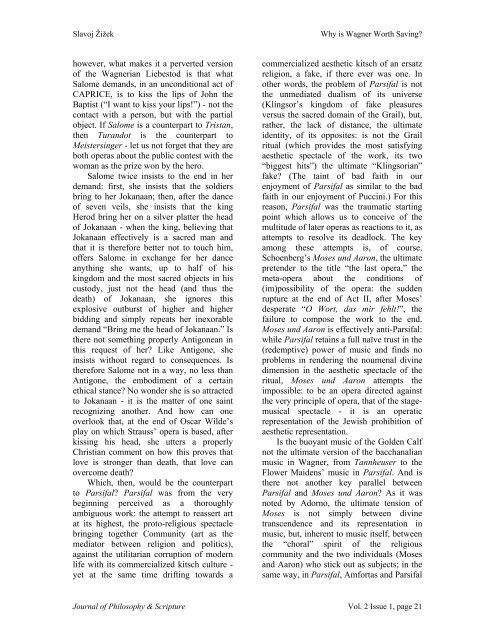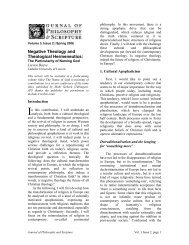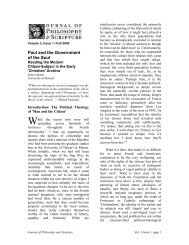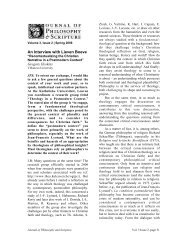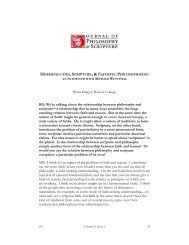Why is Wagner Worth Saving? Slavoj Žižek - Journal of Philosophy ...
Why is Wagner Worth Saving? Slavoj Žižek - Journal of Philosophy ...
Why is Wagner Worth Saving? Slavoj Žižek - Journal of Philosophy ...
Create successful ePaper yourself
Turn your PDF publications into a flip-book with our unique Google optimized e-Paper software.
<strong>Slavoj</strong> Žižek<br />
<strong>Why</strong> <strong>is</strong> <strong>Wagner</strong> <strong>Worth</strong> <strong>Saving</strong>?<br />
however, what makes it a perverted version<br />
<strong>of</strong> the <strong>Wagner</strong>ian Liebestod <strong>is</strong> that what<br />
Salome demands, in an unconditional act <strong>of</strong><br />
CAPRICE, <strong>is</strong> to k<strong>is</strong>s the lips <strong>of</strong> John the<br />
Bapt<strong>is</strong>t (“I want to k<strong>is</strong>s your lips!”) - not the<br />
contact with a person, but with the partial<br />
object. If Salome <strong>is</strong> a counterpart to Tr<strong>is</strong>tan,<br />
then Turandot <strong>is</strong> the counterpart to<br />
Me<strong>is</strong>tersinger - let us not forget that they are<br />
both operas about the public contest with the<br />
woman as the prize won by the hero.<br />
Salome twice ins<strong>is</strong>ts to the end in her<br />
demand: first, she ins<strong>is</strong>ts that the soldiers<br />
bring to her Jokanaan; then, after the dance<br />
<strong>of</strong> seven veils, she ins<strong>is</strong>ts that the king<br />
Herod bring her on a silver platter the head<br />
<strong>of</strong> Jokanaan - when the king, believing that<br />
Jokanaan effectively <strong>is</strong> a sacred man and<br />
that it <strong>is</strong> therefore better not to touch him,<br />
<strong>of</strong>fers Salome in exchange for her dance<br />
anything she wants, up to half <strong>of</strong> h<strong>is</strong><br />
kingdom and the most sacred objects in h<strong>is</strong><br />
custody, just not the head (and thus the<br />
death) <strong>of</strong> Jokanaan, she ignores th<strong>is</strong><br />
explosive outburst <strong>of</strong> higher and higher<br />
bidding and simply repeats her inexorable<br />
demand “Bring me the head <strong>of</strong> Jokanaan.” Is<br />
there not something properly Antigonean in<br />
th<strong>is</strong> request <strong>of</strong> her? Like Antigone, she<br />
ins<strong>is</strong>ts without regard to consequences. Is<br />
therefore Salome not in a way, no less than<br />
Antigone, the embodiment <strong>of</strong> a certain<br />
ethical stance? No wonder she <strong>is</strong> so attracted<br />
to Jokanaan - it <strong>is</strong> the matter <strong>of</strong> one saint<br />
recognizing another. And how can one<br />
overlook that, at the end <strong>of</strong> Oscar Wilde’s<br />
play on which Strauss’ opera <strong>is</strong> based, after<br />
k<strong>is</strong>sing h<strong>is</strong> head, she utters a properly<br />
Chr<strong>is</strong>tian comment on how th<strong>is</strong> proves that<br />
love <strong>is</strong> stronger than death, that love can<br />
overcome death?<br />
Which, then, would be the counterpart<br />
to Parsifal? Parsifal was from the very<br />
beginning perceived as a thoroughly<br />
ambiguous work: the attempt to reassert art<br />
at its highest, the proto-religious spectacle<br />
bringing together Community (art as the<br />
mediator between religion and politics),<br />
against the utilitarian corruption <strong>of</strong> modern<br />
life with its commercialized kitsch culture -<br />
yet at the same time drifting towards a<br />
commercialized aesthetic kitsch <strong>of</strong> an ersatz<br />
religion, a fake, if there ever was one. In<br />
other words, the problem <strong>of</strong> Parsifal <strong>is</strong> not<br />
the unmediated dual<strong>is</strong>m <strong>of</strong> its universe<br />
(Klingsor’s kingdom <strong>of</strong> fake pleasures<br />
versus the sacred domain <strong>of</strong> the Grail), but,<br />
rather, the lack <strong>of</strong> d<strong>is</strong>tance, the ultimate<br />
identity, <strong>of</strong> its opposites: <strong>is</strong> not the Grail<br />
ritual (which provides the most sat<strong>is</strong>fying<br />
aesthetic spectacle <strong>of</strong> the work, its two<br />
“biggest hits”) the ultimate “Klingsorian”<br />
fake? (The taint <strong>of</strong> bad faith in our<br />
enjoyment <strong>of</strong> Parsifal as similar to the bad<br />
faith in our enjoyment <strong>of</strong> Puccini.) For th<strong>is</strong><br />
reason, Parsifal was the traumatic starting<br />
point which allows us to conceive <strong>of</strong> the<br />
multitude <strong>of</strong> later operas as reactions to it, as<br />
attempts to resolve its deadlock. The key<br />
among these attempts <strong>is</strong>, <strong>of</strong> course,<br />
Schoenberg’s Moses und Aaron, the ultimate<br />
pretender to the title “the last opera,” the<br />
meta-opera about the conditions <strong>of</strong><br />
(im)possibility <strong>of</strong> the opera: the sudden<br />
rupture at the end <strong>of</strong> Act II, after Moses’<br />
desperate “O Wort, das mir fehlt!”, the<br />
failure to compose the work to the end.<br />
Moses und Aaron <strong>is</strong> effectively anti-Parsifal:<br />
while Parsifal retains a full naïve trust in the<br />
(redemptive) power <strong>of</strong> music and finds no<br />
problems in rendering the noumenal divine<br />
dimension in the aesthetic spectacle <strong>of</strong> the<br />
ritual, Moses und Aaron attempts the<br />
impossible: to be an opera directed against<br />
the very principle <strong>of</strong> opera, that <strong>of</strong> the stagemusical<br />
spectacle - it <strong>is</strong> an operatic<br />
representation <strong>of</strong> the Jew<strong>is</strong>h prohibition <strong>of</strong><br />
aesthetic representation.<br />
Is the buoyant music <strong>of</strong> the Golden Calf<br />
not the ultimate version <strong>of</strong> the bacchanalian<br />
music in <strong>Wagner</strong>, from Tannheuser to the<br />
Flower Maidens’ music in Parsifal. And <strong>is</strong><br />
there not another key parallel between<br />
Parsifal and Moses und Aaron? As it was<br />
noted by Adorno, the ultimate tension <strong>of</strong><br />
Moses <strong>is</strong> not simply between divine<br />
transcendence and its representation in<br />
music, but, inherent to music itself, between<br />
the “choral” spirit <strong>of</strong> the religious<br />
community and the two individuals (Moses<br />
and Aaron) who stick out as subjects; in the<br />
same way, in Parsifal, Amfortas and Parsifal<br />
<strong>Journal</strong> <strong>of</strong> <strong>Philosophy</strong> & Scripture Vol. 2 Issue 1, page 21


